What is school readiness and how exactly do you know if a child is ready for school or not?
This guide, written for teachers and parents, is an overview and includes a school readiness checklist for easy reference.
Read on to find out what school readiness is, how to know if a child is ready and what you can do to help kids achieve it.
In the field of early childhood education, school readiness refers to whether a child is ready to benefit from formal education in a group context.
What Does School Readiness Mean?
School readiness means a child has learned the necessary skills to be able to cope and thrive in the first grade of school – known as Grade One or First Grade in most countries.
The first grade of school is the first formal year. All years leading up to this grade are considered informal schooling.
Kindergarten Readiness
The year before the first grade is also considered an important year and is basically a semi-formal preparation for starting formal schooling.
Depending on what country you live in, this class may be referred to as Kindergarten, Reception Year, Grade R, Grade 0 or something similar.
While most school readiness skills checklists out there are for kindergarten, this year should not be mistaken as the official start of formal schooling, as kindergarten should still include many play-based learning experiences.
The checklist below can be used as a general Kindergarten readiness checklist. However, some skills – such as sound and letter recognition – will still be developing during this year.
How is School Readiness Measured?
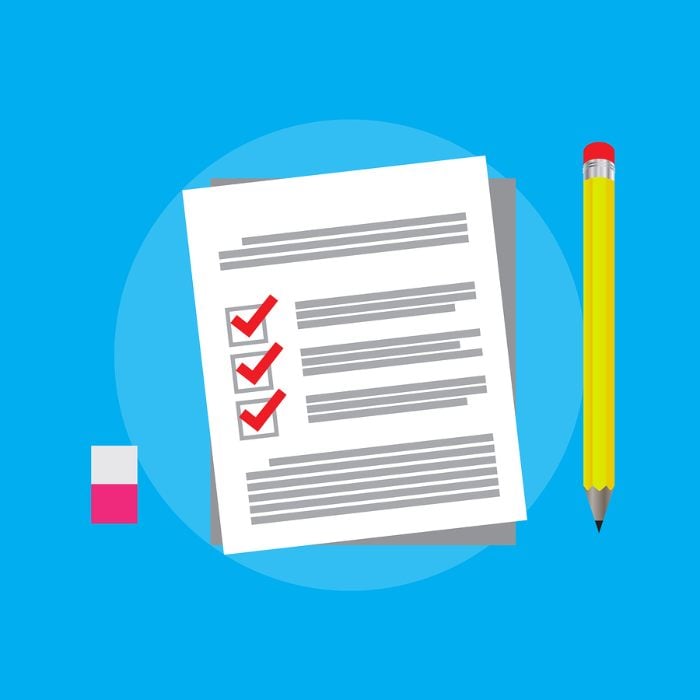
Unlike a high school pupil taking a sit-down entrance exam, a young child’s holistic development cannot be measured with a test.
This is especially true because a huge part of their readiness has to do with physical, emotional and social maturity.
There are no exact criteria and no actual way to establish 100% readiness because all children are completely different and develop at different rates. They also have different strengths and weaknesses.
All the readiness checklists online have different criteria, although they share many similarities. A checklist is merely a general guide.
Therefore children are ready for school when:
- They meet most of the criteria on the checklist
- They are able to cope in a formal environment
- They are emotionally mature
- They interact and behave in a similar way to peers of similar age
Readiness is certainly not an exact science. It is determined by understanding a child and determining whether you think they will cope in elementary/ primary school.
School Assessment Tests
Some schools prefer to do a school readiness assessment with young children going into the first grade.
The test is usually quite short as children of this age have a limited concentration span.
This kind of assessment usually involves testing for specific skills such as a child’s auditory memory or phonological awareness (e.g. hearing rhyming sounds).
Assessments may provide some insight into a child’s ability. There will not be a strict measuring of criteria but rather an opinion formed of the child’s predicted general ability to fit into a formal grade.
What Does School Readiness Look Like?
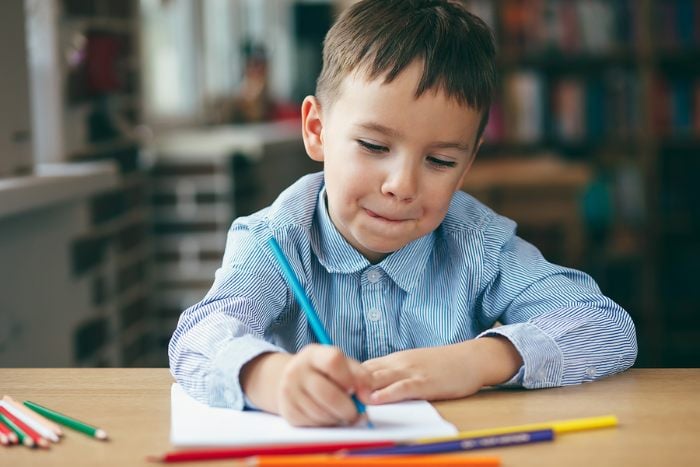
In order for children to be considered ready for school, they must have developed their emotional, social, physical and cognitive skills.
A child who is ready for school has well-developed:
- Physical and motor skills
- Visual, auditory and tactile perception
- Listening skills
- Communication skills, language ability and wide vocabulary
- Pre-mathematical skills (the ability to manipulate concrete materials)
- Basic chemistry, physics and biology skills (through play and discovery e.g. blocks and water)
- Problem-solving skills
- Ability to express through art, music and stories
- Love of books and a desire to read
Criteria for School Readiness
The following is a general list of criteria for determining school readiness.
The milestones are set out in the four developmental areas – emotional, social, physical and cognitive.
Emotional Development
- Shows independence
- Separates easily at school drop-off
- Has a healthy self-esteem and feels competent
- Accepts authority and obeys simple rules at home and school
- Has self-care skills – dressing, eating, and going to the bathroom independently
- Can go places without a parent – e.g. stay over at granny, visit a friend
- Expresses feelings in a healthy way
- Works on a task independently
- Works quietly and calmly
- Asks questions and seeks help when necessary
- Follows home and school routines with ease
- Copes with disappointments in a mature way
- Shows perseverance and determination when working on a task
Social Development
- Takes turns and shares with others
- Forms healthy relationships with peers
- Socializes with more than one peer (not only one ‘special’ friend)
- Is assertive when necessary and can also follow another’s lead
- Handles conflict appropriately and independently (without always reporting it to an adult)
- Shows manners unprompted -e.g. says please, thank you and sorry
- Respects others’ property
- Works cooperatively in a group
- Shows respect and listens when someone is speaking – a peer or adult
Physical and Motor Development
- Runs easily, climbs and moves with agility
- Balances when walking along a beam
- Distinguishes between left and right
- Throws and catches a ball
- Walks along a straight line
- Hops on one leg and hops with legs together
- Stands on one leg for 5 seconds, maintaining balance
- Skips
- Crosses the midline
- Holds a pencil or crayon correctly
- Cuts along a line and controls a pair of scissors
- Does activities that require fine motor control – e.g. pasting, tearing, placing pegs on a board
- Determines his or her dominant hand
- Moves rhythmically to music
- Sits at a desk for a period of time with good posture and without slouching or tiring
- Sits on a floor/carpet with legs crossed without flopping over
Cognitive Development
- Recognizes shapes and colours
- Builds a jigsaw puzzle
- Notices similarities and differences in a picture
- Distinguishes foreground from background in a picture
- Estimates, plans and evaluates
- Counts with one-to-one correspondence (e.g. by touching one item at a time)
- Groups, classifies and sorts objects and information
- Copies a simple pattern
- Does basic addition and subtraction (e.g. what is one more?)
- Uses mathematical terms such as more, less, first, altogether, longer, shorter, etc.
- Has a concept of time – weekdays, seasons, morning/afternoon/evening, etc.
- Understands cause and effect (e.g. consequences of certain actions)
- Solves problems with insight
- Has excellent listening skills
- Is able to follow verbal instructions (at least a 2 or 3 part instruction)
- Listens to a story and recalls the events in sequence
- Answers questions about a story and remembers the details
- Memorizes simple songs and nursery rhymes
- Identifies rhyming words
- Hears the beginning and ending sounds in 3-letter words e.g. bat
- Identifies and discusses characters in a story
- Expresses opinions about a story
- Shows an interest in books and reading
- Knows the names of some of the letters
- Speaks clearly and uses grammar correctly
- Has well-developed vocabulary
- Participates in discussions at home and at school
- Concentrates on a single task for at least 20 minutes
- Completes tasks
This checklist should give you a good idea of where your child is at.
Is School Readiness Important?
For children to reach their full potential and benefit from formal education, being ready is extremely important.
When children are pushed into a grade they are not ready for, not only does it not benefit them, but they can also regress.
They may struggle to keep up academically or emotionally, which may negatively affect their self-worth and emotional development.
They might even struggle to socialize if they are not yet mature enough for the group, which has negative effects on their social development.
How to Prepare Your Child for School
Even if a child attends preschool, parents can also play a big role in helping prepare for school.
I firmly believe that children learn far more from their parents than they do from anyone else. Parents are a child’s first connection with the world. They learn non-stop by watching and interacting with them.
This does not mean that parents ought to be stressing their children out while trying to get them ready. As you will read here, hard work and learning is all about play.
Read on to find out how to get your children ready for school.
School Readiness Begins in Infancy
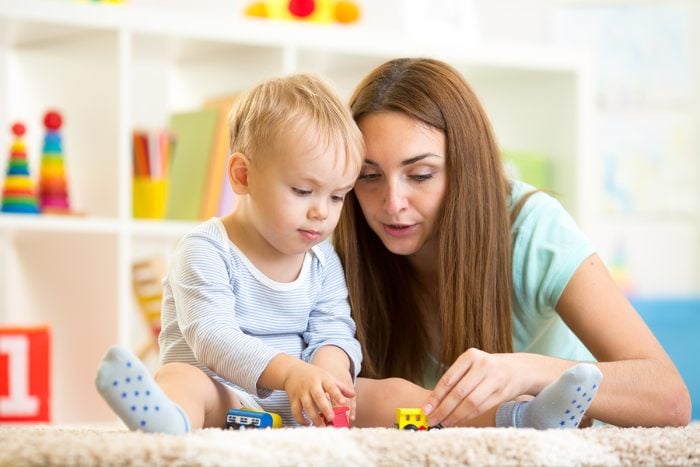
School readiness is not something children suddenly acquire when they come of age. It is an accumulation of all the learning and skills a child has picked up right from birth.
Being ready is more about general maturity and skill level than it is about learning specific things or having certain knowledge.
This is one of the reasons I don’t think parents need to follow ‘programs’ for preschoolers. These programs usually come with a set of themes and all the activities are laid out day by day, to be followed in a certain sequence.
Most often, they get put aside when it becomes too much effort to follow or life gets in the way.
Preschool is not rigid and neither should a child’s time at home be.
Learning Through Play
So just how do children learn all these wonderful skills that will get them ready for formal education?
Through none other than good old-fashioned play.
This is sadly becoming a bit underrated in today’s society of packing children’s schedules with non-stop extra activities and introducing formal activities such as reading and writing too early.
Play is the most important activity for your child’s overall development.
What is important is that your child has ample opportunity to engage in all types of play.
There should be sufficient time for free play, where your child decides what to play and where to play, and there should be time for adult-guided activities.
School Readiness Activities and Tips for Parents
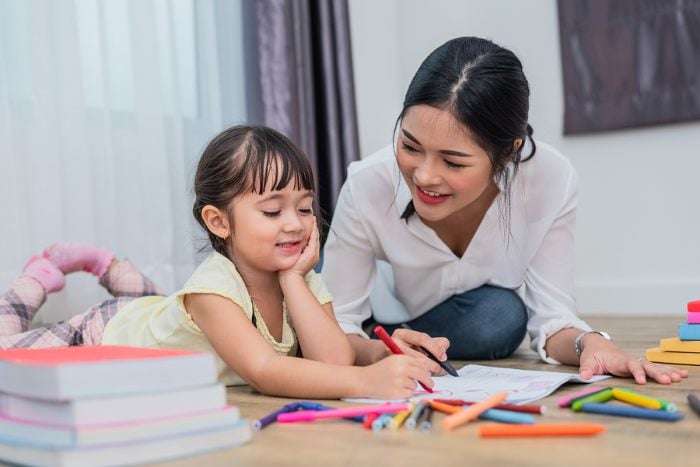
Any play activity that you engage in with your child or any free play session your child engages in is part of getting ready for school.
Where you can make a difference is in providing activities for your child that are varied and therefore work on different skills.
You don’t necessarily need to be playing with your child all the time.
Sometimes it is as simple as taking out different materials or making suggestions and offering new ideas. Other times, you will want to really get involved and do an activity together or play a game to work on a specific skill.
The most important thing is that you are aware of the skills children need to learn before formal schooling and that you try wherever possible to create a play opportunity to work on those different skills.
What Skills Should you Teach your Child?
In a nutshell, your children need to learn these basic skills through play:
- Fine motor skills
- Gross motor skills
- Language skills
- Listening skills
- Visual perception
- Auditory perception (including phonological awareness)
- Pre-reading skills
- Pre-writing skills
- Early mathematical skills
- Social skills
- Emotional intelligence
Why Do Children Need these Skills?
Everything your child needs to do at school will rely on these basic skills. Something as simple as holding a pencil and writing requires well-developed gross motor, fine motor and visual perceptual skills.
In order to learn to read, children need excellent auditory and visual perception. Learning letters and the sounds they make is not all there is to reading. These are just a few things involved in learning to read:
- Hearing sounds – e.g. through learning nursery rhymes
- Hearing rhyming words and patterns
- Distinguishing whether sounds are the same or different
- Hearing the beginning sound in a word, and the end sound
- Hearing sounds that are missing
- Seeing and identifying letters – an understanding of shape is crucial
- Perceiving similarities and differences (to not confuse b and d)
- Being able to identify patterns (to read words by sight)
- Having good visual memory (to remember common patterns in words)
Many tasks at school require a combination of different skills so the best chance you can give your child is to ensure all their basics are in place.
How Can You Teach Your Child These Skills?
Many of these skills will be learned naturally through free play; however, they should also be learned through adult-guided play-based games and activities.
You can look up all the skills mentioned above and find activity ideas to work on all these skills.
What if My Child is Not Ready for School?
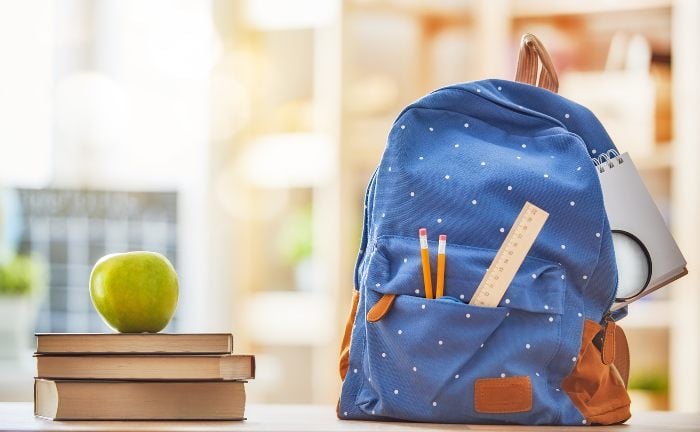
If you go through the checklist and feel your child may not be ready, don’t worry or feel you have done something wrong. I have taught many children who repeated a preschool or kindergarten grade and went on to do well in school.
The younger the child is when repeating, the easier it will be. Repeating a grade higher up (e.g. 5th or 6th) has more damaging effects on a child as they then struggle with feeling incompetent and losing their peers in their grade.
The worst thing you can do is push your child up if it is clear he or she will struggle. Playing catch up all the time and feeling incompetent and incapable will not help their development in the long run.
Repeating an early grade is not serious at all. Simply let it be if necessary and, along with the school, keep helping your child as best as you can.
Signs Your Child May Not be Ready for School
These are very generalized guidelines, but if your child displays some of these characteristics, he or she may need extra time to mature:
- Appears younger than their peers
- Has a short attention span and poor concentration
- Has poor eye-hand coordination
- Moves in a clumsy or uncoordinated way
- Struggles with fine motor skills such as cutting, holding a pencil, etc.
- Is dependent on adults for self-care tasks
I hope you found this readiness-for-school checklist useful.
The information in this article is based on my own qualifications and experience in teaching, and is also backed by the information shared by Martie Pieterse in her book “Language and School Readiness” as well as the book “Total Learning: Developmental Curriculum for the Young Child“, by Joanne Hendrick.
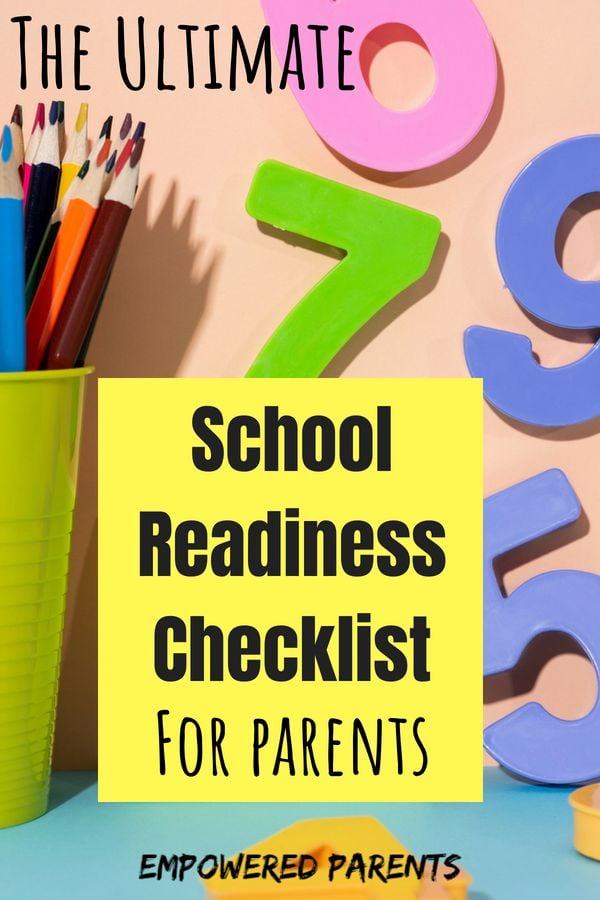
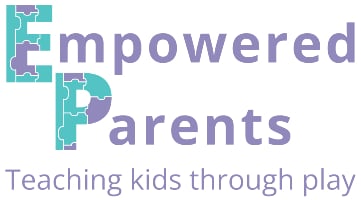
Kyle Shoba
Friday 30th of April 2021
Good evening ,I love this story and I would like to use some ideas for my school assignment and I would like to know the date it was written in so I can reference it
Tanja Mcilroy
Saturday 1st of May 2021
Hello Kyle, Thank you. The publish date for this article is 29 August 2018. Kind regards, Tanja